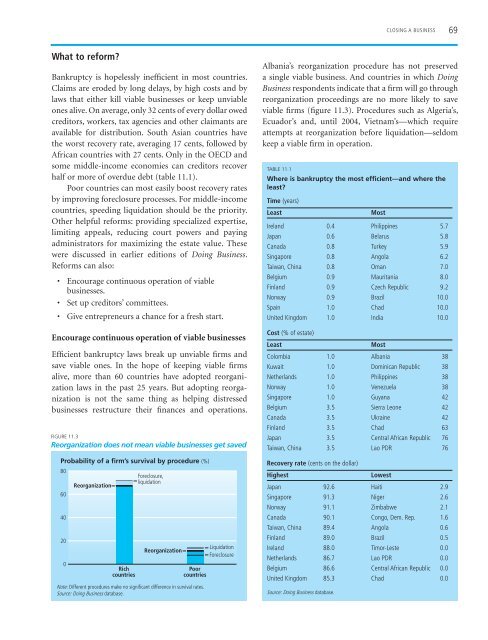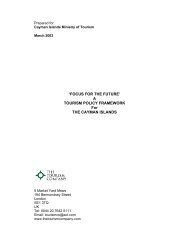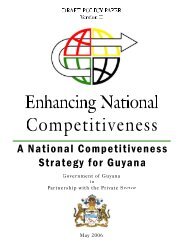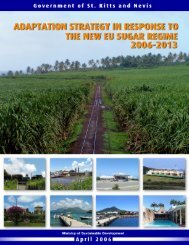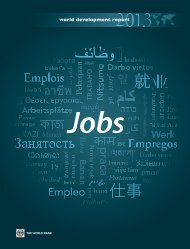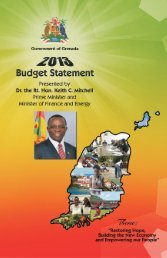Creating
Doing Business in 2006 -- Creating Jobs - Caribbean Elections
Doing Business in 2006 -- Creating Jobs - Caribbean Elections
Create successful ePaper yourself
Turn your PDF publications into a flip-book with our unique Google optimized e-Paper software.
CLOSING A BUSINESS 69<br />
What to reform?<br />
Bankruptcy is hopelessly inefficient in most countries.<br />
Claims are eroded by long delays, by high costs and by<br />
laws that either kill viable businesses or keep unviable<br />
ones alive. On average, only 32 cents of every dollar owed<br />
creditors, workers, tax agencies and other claimants are<br />
available for distribution. South Asian countries have<br />
the worst recovery rate, averaging 17 cents, followed by<br />
African countries with 27 cents. Only in the OECD and<br />
some middle-income economies can creditors recover<br />
half or more of overdue debt (table 11.1).<br />
Poor countries can most easily boost recovery rates<br />
by improving foreclosure processes. For middle-income<br />
countries, speeding liquidation should be the priority.<br />
Other helpful reforms: providing specialized expertise,<br />
limiting appeals, reducing court powers and paying<br />
administrators for maximizing the estate value. These<br />
were discussed in earlier editions of Doing Business.<br />
Reforms can also:<br />
• Encourage continuous operation of viable<br />
businesses.<br />
• Set up creditors’ committees.<br />
• Give entrepreneurs a chance for a fresh start.<br />
Encourage continuous operation of viable businesses<br />
Efficient bankruptcy laws break up unviable firms and<br />
save viable ones. In the hope of keeping viable firms<br />
alive, more than 60 countries have adopted reorganization<br />
laws in the past 25 years. But adopting reorganization<br />
is not the same thing as helping distressed<br />
businesses restructure their finances and operations.<br />
<br />
<br />
<br />
<br />
<br />
<br />
<br />
<br />
<br />
<br />
<br />
<br />
<br />
<br />
<br />
<br />
<br />
<br />
<br />
<br />
Albania’s reorganization procedure has not preserved<br />
a single viable business. And countries in which Doing<br />
Business respondents indicate that a firm will go through<br />
reorganization proceedings are no more likely to save<br />
viable firms (figure 11.3). Procedures such as Algeria’s,<br />
Ecuador’s and, until 2004, Vietnam’s—which require<br />
attempts at reorganization before liquidation—seldom<br />
keep a viable firm in operation.<br />
TABLE 11.1<br />
Where is bankruptcy the most efficient—and where the<br />
least?<br />
Time (years)<br />
Least<br />
Most<br />
Ireland 0.4 Philippines 5.7<br />
Japan 0.6 Belarus 5.8<br />
Canada 0.8 Turkey 5.9<br />
Singapore 0.8 Angola 6.2<br />
Taiwan, China 0.8 Oman 7.0<br />
Belgium 0.9 Mauritania 8.0<br />
Finland 0.9 Czech Republic 9.2<br />
Norway 0.9 Brazil 10.0<br />
Spain 1.0 Chad 10.0<br />
United Kingdom 1.0 India 10.0<br />
Cost (% of estate)<br />
Least<br />
Most<br />
Colombia 1.0 Albania 38<br />
Kuwait 1.0 Dominican Republic 38<br />
Netherlands 1.0 Philippines 38<br />
Norway 1.0 Venezuela 38<br />
Singapore 1.0 Guyana 42<br />
Belgium 3.5 Sierra Leone 42<br />
Canada 3.5 Ukraine 42<br />
Finland 3.5 Chad 63<br />
Japan 3.5 Central African Republic 76<br />
Taiwan, China 3.5 Lao PDR 76<br />
Recovery rate (cents on the dollar)<br />
Highest<br />
Lowest<br />
Japan 92.6 Haiti 2.9<br />
Singapore 91.3 Niger 2.6<br />
Norway 91.1 Zimbabwe 2.1<br />
Canada 90.1 Congo, Dem. Rep. 1.6<br />
Taiwan, China 89.4 Angola 0.6<br />
Finland 89.0 Brazil 0.5<br />
Ireland 88.0 Timor-Leste 0.0<br />
Netherlands 86.7 Lao PDR 0.0<br />
Belgium 86.6 Central African Republic 0.0<br />
United Kingdom 85.3 Chad 0.0<br />
Source: Doing Business database.


